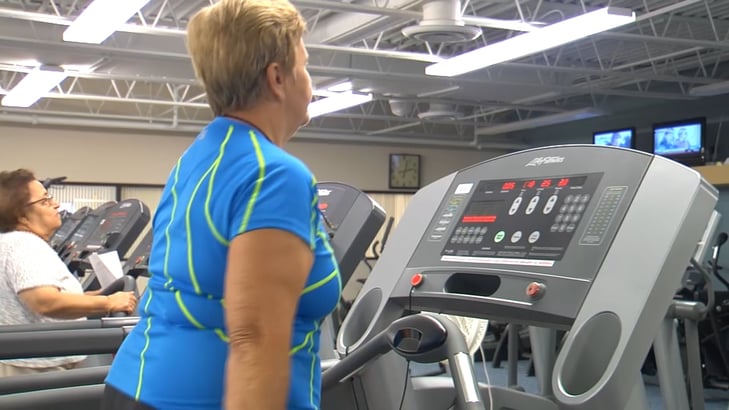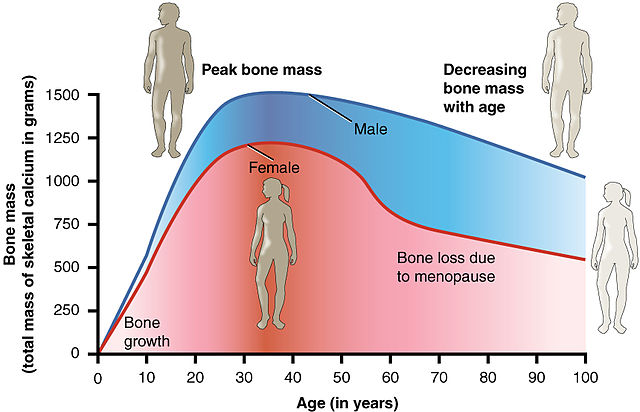
Osteoporosis, or brittle bones, is a serious problem for many seniors living in Cincinnati — especially for older women.
Our bodies’ bone tissues are always breaking down and being rebuilt. Osteoporosis occurs when the rate of new bone creation can’t keep up with the rate of bone density loss. It’s a normal part of aging for most people, men and women alike, but the changeover from bone strength stasis to low bone density can be dramatic for women once they reach menopause.
An elder with osteoporosis who experiences an otherwise minor fall or simple injury could incur in a serious, possibly life-threatening fracture.
Is osteoporosis inevitable? Well, if you live long enough, yes at some level. But there are techniques and tips that can help you keep your bones stronger, longer, and reduce your risk of serious, fall-related injuries.
Read on to find out all the ways you can improve your skeletal health and prevent osteoporosis.
1. Stay active
Regular, weight-bearing exercise hardens the connection points between your bones and the ligaments, tendons and muscles that move them. Progressive training on a weight circuit — including isometric and isotonic exercises — is the best type of activity for improving bone health.
1 in 3 women over 50 will experience osteoporotic fractures. As will 1 in 5 men.
If you’re not able to lift, then walking, jogging, stair-climbing and other impact exercises can help (at least for the bones in your legs and lower back). Balance exercises like yoga and tai chi don’t do much to directly improve bone health, but they do make falls less likely in the future.
Although swimming, recumbent cycling and other cardiovascular workouts are wonderful for your heart and lungs, they do little for your bone health. So, don’t rely exclusively on those activities to stay fit.
2. Don’t smoke
What does smoking have to do with your bones? A lot. Many of the toxins (cancer-causing free radical isotopes) found in cigarette, cigar and pipe smoke have been linked to bone density loss.
When free radicals in your body encounter calcium and magnesium ions — the primary nutrients needed for new bone tissue creation — they bond with them and render them unusable.

They also leach calcium and other minerals out of existing bone, essentially leaving your bones full of atom and molecule-sized holes, along which microfractures develop. Microfractures are weak points that can cause chronic inflammatory pain and, under outside stress or continued neglect, grow into visible fractures.
3. Avoid consuming excessive alcohol
Studies have found that adults who consume two or more alcoholic drinks a day may not be able to form new bone tissues as efficiently as those who moderate or abstain. Moreover, intoxication causes loss of balance and makes fall-related injuries much more likely.
4. Eat the right foods
Good nutrition is as essential for keeping your bones healthy as regular weight-bearing exercise. You need to make the right nutrients and minerals available to your body so that it can form new bone out of them.
Think about it this way — without iron, you can’t make steel girders and build skyscrapers with them, right? Well, without enough nutritional intake your body can’t grow new bone or patch damaged portions of your skeleton.
Here’s what you need for bone health and maintenance:
Protein. This is one of the essentials for building bone and muscle alike. Most Americans get plenty of protein in their diet, because most of us eat some form of meat daily.
It’s important for your heart health, of course, that that meat intake be limited to reasonable portions and lean cuts (shade more often toward fish and poultry, instead of a lot of red meat or pork).
For vegetarians, egg whites and low-fat dairy provide plenty of protein. For vegans, eat plenty of soy, nuts and seeds. Quinoa — a South American grain now found in most supermarkets — also provides a decent portion of protein.
Calcium. Whether you get it from dairy, from leafy green veggies like spinach, or from a daily, chewable calcium supplement, you need this mineral to build skeletal tissue and help regulate your heart’s rhythm.
Vitamin D. Called the “sunshine nutrient” because it is produced by your skin when you’re exposed to normal amounts of UV light, Vitamin D is necessary because the body uses it to absorb and employ calcium. Without Vitamin D present, you’d just excrete calcium in your sweat and urine.
Most younger adults and children get plenty of time outdoors and thus have plenty of Vitamin D stores. Many seniors, though, don’t go outdoors often — particularly in the winter months. Talk to your doctor to find out whether you should be taking a daily Vitamin D supplement.
B Vitamins and folic acid. Vitamins B6, B12 and folic acid may play a strong role in preventing osteoporosis. Research has indicated that they change the amino acid homocysteine, high levels of which in the body may trigger osteoporotic changes, into other amino acids that the body uses to build bone.
A word of caution: B12 is only available from animal-based dietary choices. Vegans must take a B12 supplement to stay healthy.
Magnesium. Excellent sources of magnesium include green vegetables, legumes, nuts, seeds, unrefined grains and fish. If you’re eating normal amounts of these, you’re living right.
Vitamin A. Orange and yellow veggies, especially carrots, provide Beta carotene — the crucial precursor nutrient your body breaks down into Vitamin A.
Vitamin K. Vitamin K regulates bone mineralization (hardening). Get it from leafy green vegetables (see the trend here?) like lettuce, spinach and cabbage. Liver, cheeses and soybean-based foods also provide Vitamin K.
Zinc. It’s not just for cold prevention! Zinc is one of the minerals that contributes to bone hardness. You need it. It’s available in lean meats and cereal grains.
5. Stay trim
When you’re overweight, you place your bones under undue strain. Your frame simply wasn’t meant to carry around a lot of stored fat.
If you’re tipping the scale to the wrong side, lighten the load on your skeleton. Slim down and watch that waistline. Your heart and lungs will thank you, too.












